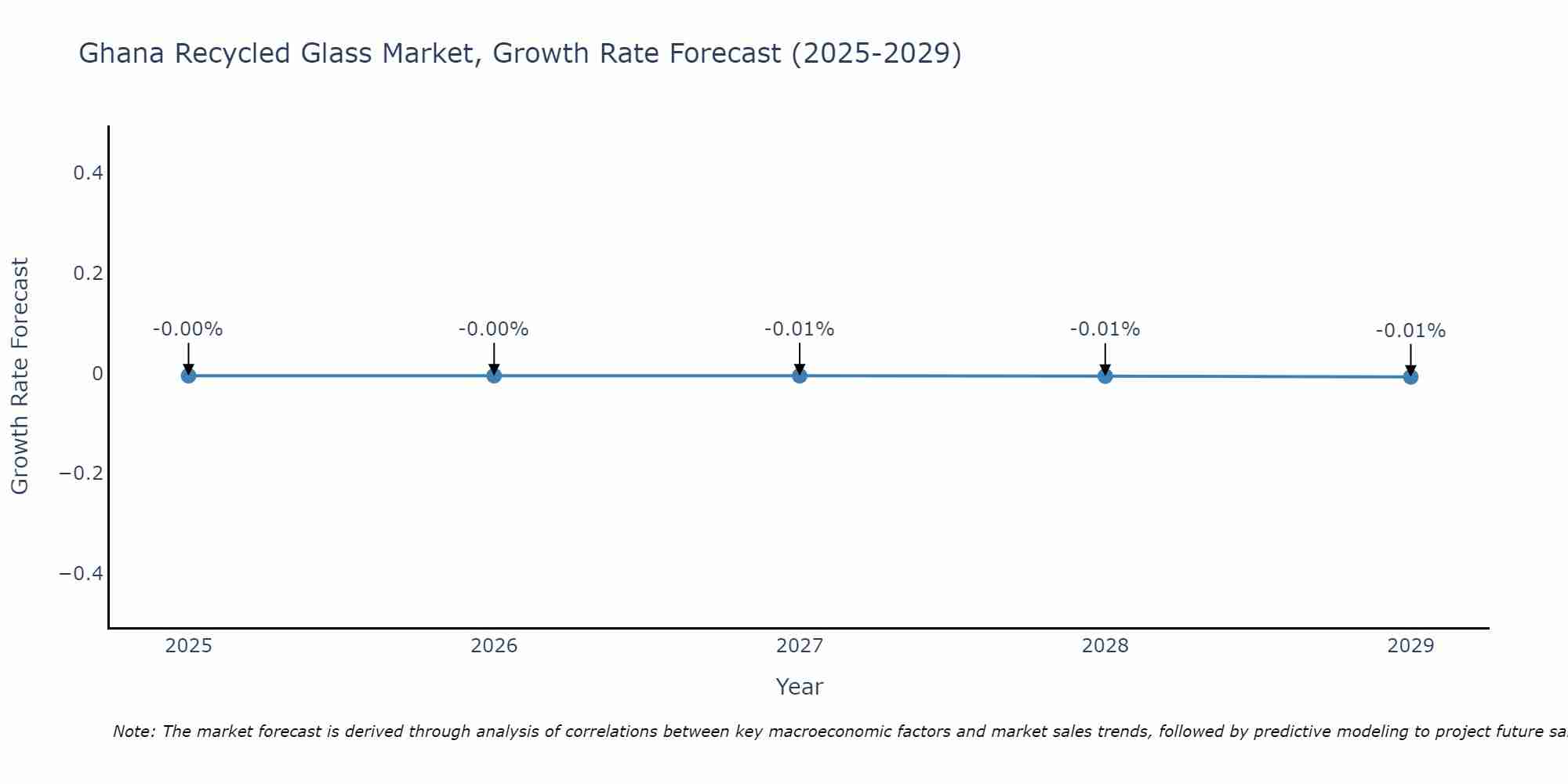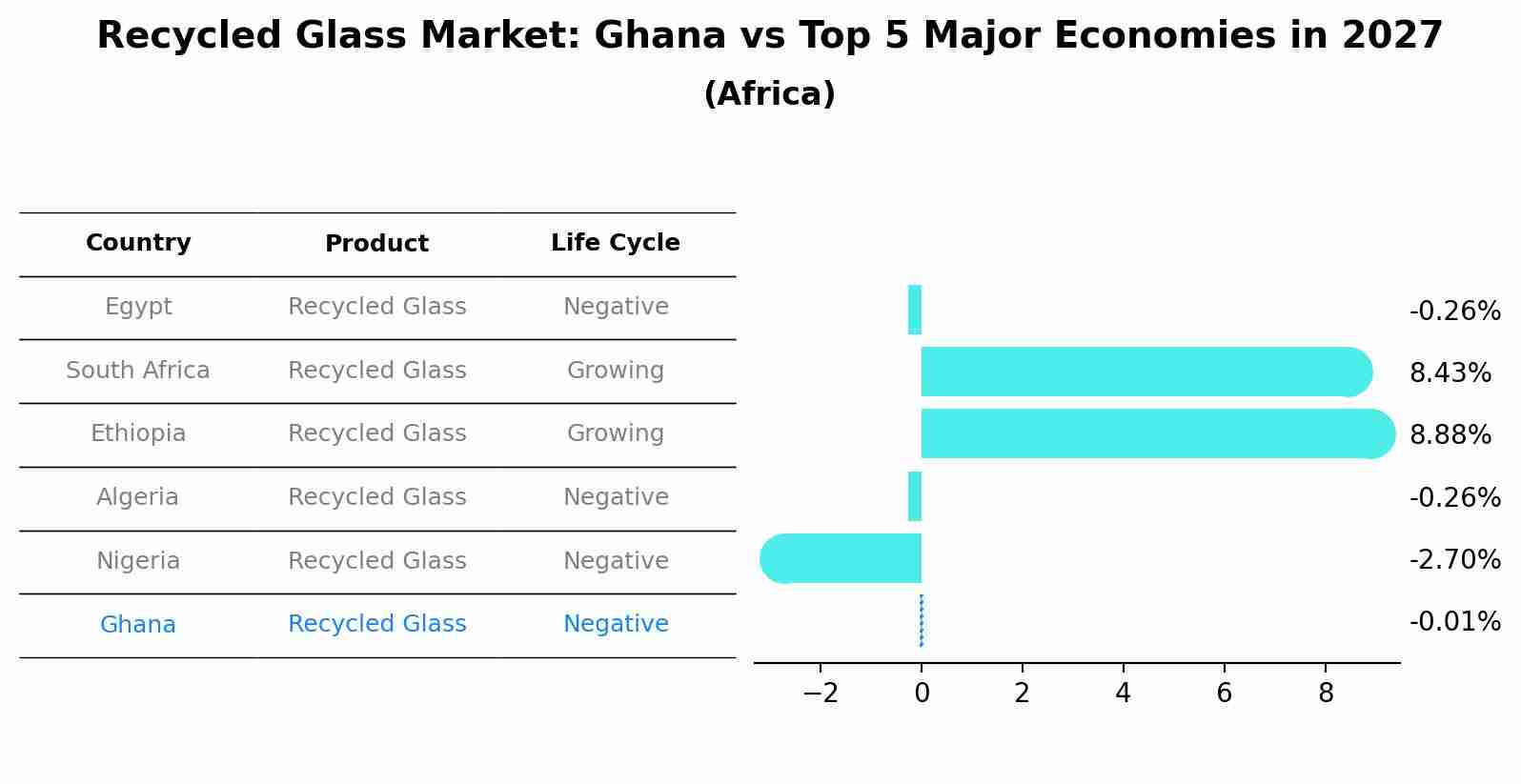Ghana Recycled Glass Market (2025-2031) Outlook | Share, Trends, Growth, Revenue, Size, Forecast, Value, Industry, Analysis & Companies
| Product Code: ETC355736 | Publication Date: Aug 2022 | Updated Date: Aug 2025 | Product Type: Market Research Report | |
| Publisher: 6Wresearch | Author: Ravi Bhandari | No. of Pages: 75 | No. of Figures: 35 | No. of Tables: 20 |
Ghana Recycled Glass Market Size Growth Rate
The Ghana Recycled Glass Market is projected to witness mixed growth rate patterns during 2025 to 2029. The growth rate begins at -0.00% in 2025, climbs to a high of -0.00% in 2026, and moderates to -0.01% by 2029.

Recycled Glass Market: Ghana vs Top 5 Major Economies in 2027 (Africa)
The Recycled Glass market in Ghana is projected to grow at a negative growth rate of -0.01% by 2027, within the Africa region led by Egypt, along with other countries like South Africa, Ethiopia, Algeria and Nigeria, collectively shaping a dynamic and evolving market environment driven by innovation and increasing adoption of emerging technologies.

Ghana Recycled Glass Market Synopsis
The Ghana Recycled Glass Market is experiencing steady growth driven by increasing awareness of environmental sustainability and the government`s efforts to promote recycling initiatives. The market is characterized by a growing number of small and medium-sized enterprises engaged in collecting, processing, and selling recycled glass products. These companies are offering a wide range of recycled glass items such as bottles, vases, and decorations, catering to both domestic and international markets. The demand for recycled glass products is rising among environmentally conscious consumers and businesses looking to reduce their carbon footprint. However, challenges such as limited collection infrastructure and inconsistent quality standards pose obstacles to market growth. Overall, the Ghana Recycled Glass Market shows promising potential for further development and expansion in the coming years.
Ghana Recycled Glass Market Trends
The Ghana recycled glass market is experiencing a growing trend towards sustainable practices and environmental consciousness. Consumers are increasingly seeking products made from recycled glass due to their eco-friendly nature and reduced carbon footprint. This trend is driving businesses in the market to focus on developing innovative recycling techniques, improving collection and sorting processes, and creating new product offerings from recycled glass. Additionally, government initiatives promoting recycling and waste management are further supporting the growth of the recycled glass market in Ghana. Overall, the market is witnessing a shift towards a more sustainable approach, with both consumers and industry players recognizing the importance of recycling glass to minimize environmental impact and promote a circular economy.
Ghana Recycled Glass Market Challenges
In the Ghana recycled glass market, some challenges include limited collection infrastructure and inconsistent supply of raw materials. The lack of widespread recycling programs and facilities hinders the efficient collection and processing of glass waste. Additionally, the informal nature of the recycling sector in Ghana leads to inconsistent supply chains, making it difficult for businesses to rely on a steady source of recycled glass. Furthermore, there is a need for increased awareness and education among consumers and businesses to promote recycling practices and create a sustainable demand for recycled glass products. Overcoming these challenges requires investment in recycling infrastructure, collaboration between stakeholders, and advocacy for sustainable waste management practices in the country.
Ghana Recycled Glass Market Investment Opportunities
The Ghana recycled glass market presents promising investment opportunities due to increasing environmental awareness and government support for sustainable practices. With a growing demand for eco-friendly products, investing in companies involved in glass recycling and manufacturing can be lucrative. Opportunities exist in establishing recycling facilities, glass collection services, and developing innovative products made from recycled glass. Collaborating with local artisans and businesses to create unique, environmentally friendly glass products for both domestic and export markets can also be a profitable venture. Additionally, investing in research and development to improve recycling processes and create new applications for recycled glass can position investors at the forefront of this emerging market in Ghana.
Jordan Agar Market Government Policies
The government of Ghana has implemented policies to promote the recycling of glass in the country. One notable policy is the establishment of the Ghana Recycling Initiative by Private Enterprises (GRIPE), which aims to increase the collection and recycling of glass bottles. Additionally, the government has implemented a waste management policy that includes provisions for the proper disposal and recycling of glass waste. These policies are aimed at promoting sustainability, reducing environmental pollution, and creating economic opportunities in the recycling sector. Overall, the government`s initiatives in the Ghana recycled glass market are focused on driving increased recycling rates and ensuring a more sustainable approach to waste management.
Ghana Recycled Glass Market Future Outlook
The future outlook for the Ghana Recycled Glass Market appears promising as the country continues to prioritize sustainability and environmental conservation. With increasing awareness of the benefits of recycling and the growing demand for eco-friendly products, the market is expected to see steady growth in the coming years. The government`s efforts to promote recycling initiatives and support local businesses in the recycling sector also bode well for the market`s expansion. Opportunities for innovation in glass recycling processes and the development of new recycled glass products further contribute to the positive outlook for the Ghana Recycled Glass Market, making it a lucrative and sustainable industry to watch.
Key Highlights of the Report:
- Ghana Recycled Glass Market Outlook
- Market Size of Ghana Recycled Glass Market, 2024
- Forecast of Ghana Recycled Glass Market, 2031
- Historical Data and Forecast of Ghana Recycled Glass Revenues & Volume for the Period 2021 - 2031
- Ghana Recycled Glass Market Trend Evolution
- Ghana Recycled Glass Market Drivers and Challenges
- Ghana Recycled Glass Price Trends
- Ghana Recycled Glass Porter's Five Forces
- Ghana Recycled Glass Industry Life Cycle
- Historical Data and Forecast of Ghana Recycled Glass Market Revenues & Volume By Product for the Period 2021 - 2031
- Historical Data and Forecast of Ghana Recycled Glass Market Revenues & Volume By Crushed Glass for the Period 2021 - 2031
- Historical Data and Forecast of Ghana Recycled Glass Market Revenues & Volume By Cullets for the Period 2021 - 2031
- Historical Data and Forecast of Ghana Recycled Glass Market Revenues & Volume By Glass Powder for the Period 2021 - 2031
- Historical Data and Forecast of Ghana Recycled Glass Market Revenues & Volume By Application for the Period 2021 - 2031
- Historical Data and Forecast of Ghana Recycled Glass Market Revenues & Volume By Glass Bottle & Containers for the Period 2021 - 2031
- Historical Data and Forecast of Ghana Recycled Glass Market Revenues & Volume By Flat Glass for the Period 2021 - 2031
- Historical Data and Forecast of Ghana Recycled Glass Market Revenues & Volume By Fiber Glass for the Period 2021 - 2031
- Historical Data and Forecast of Ghana Recycled Glass Market Revenues & Volume By Highway Beads for the Period 2021 - 2031
- Historical Data and Forecast of Ghana Recycled Glass Market Revenues & Volume By Abrasives for the Period 2021 - 2031
- Historical Data and Forecast of Ghana Recycled Glass Market Revenues & Volume By Fillers for the Period 2021 - 2031
- Historical Data and Forecast of Ghana Recycled Glass Market Revenues & Volume By Others for the Period 2021 - 2031
- Ghana Recycled Glass Import Export Trade Statistics
- Market Opportunity Assessment By Product
- Market Opportunity Assessment By Application
- Ghana Recycled Glass Top Companies Market Share
- Ghana Recycled Glass Competitive Benchmarking By Technical and Operational Parameters
- Ghana Recycled Glass Company Profiles
- Ghana Recycled Glass Key Strategic Recommendations
Frequently Asked Questions About the Market Study (FAQs):
- Single User License$ 1,995
- Department License$ 2,400
- Site License$ 3,120
- Global License$ 3,795
Search
Thought Leadership and Analyst Meet
Our Clients
Related Reports
- Canada Oil and Gas Market (2026-2032) | Share, Segmentation, Value, Industry, Trends, Forecast, Analysis, Size & Revenue, Growth, Competitive Landscape, Outlook, Companies
- Germany Breakfast Food Market (2026-2032) | Industry, Share, Growth, Size, Companies, Value, Analysis, Revenue, Trends, Forecast & Outlook
- Australia Briquette Market (2025-2031) | Growth, Size, Revenue, Forecast, Analysis, Trends, Value, Share, Industry & Companies
- Vietnam System Integrator Market (2025-2031) | Size, Companies, Analysis, Industry, Value, Forecast, Growth, Trends, Revenue & Share
- ASEAN and Thailand Brain Health Supplements Market (2025-2031) | Strategy, Consumer Insights, Analysis, Investment Trends, Opportunities, Growth, Size, Share, Industry, Revenue, Segments, Value, Segmentation, Supply, Forecast, Restraints, Outlook, Competition, Drivers, Trends, Demand, Pricing Analysis, Competitive, Strategic Insights, Companies, Challenges
- ASEAN Bearings Market (2025-2031) | Strategy, Consumer Insights, Analysis, Investment Trends, Opportunities, Growth, Size, Share, Industry, Revenue, Segments, Value, Segmentation, Supply, Forecast, Restraints, Outlook, Competition, Drivers, Trends, Demand, Pricing Analysis, Competitive, Strategic Insights, Companies, Challenges
- Europe Flooring Market (2025-2031) | Outlook, Share, Industry, Trends, Forecast, Companies, Revenue, Size, Analysis, Growth & Value
- Saudi Arabia Manlift Market (2025-2031) | Outlook, Size, Growth, Trends, Companies, Industry, Revenue, Value, Share, Forecast & Analysis
- Uganda Excavator, Crane, and Wheel Loaders Market (2025-2031) | Strategy, Consumer Insights, Analysis, Investment Trends, Opportunities, Growth, Size, Share, Industry, Revenue, Segments, Value, Segmentation, Supply, Forecast, Restraints, Outlook, Competition, Drivers, Trends, Demand, Pricing Analysis, Competitive, Strategic Insights, Companies, Challenges
- Rwanda Excavator, Crane, and Wheel Loaders Market (2025-2031) | Strategy, Consumer Insights, Analysis, Investment Trends, Opportunities, Growth, Size, Share, Industry, Revenue, Segments, Value, Segmentation, Supply, Forecast, Restraints, Outlook, Competition, Drivers, Trends, Demand, Pricing Analysis, Competitive, Strategic Insights, Companies, Challenges
Industry Events and Analyst Meet
Whitepaper
- Middle East & Africa Commercial Security Market Click here to view more.
- Middle East & Africa Fire Safety Systems & Equipment Market Click here to view more.
- GCC Drone Market Click here to view more.
- Middle East Lighting Fixture Market Click here to view more.
- GCC Physical & Perimeter Security Market Click here to view more.
6WResearch In News
- Doha a strategic location for EV manufacturing hub: IPA Qatar
- Demand for luxury TVs surging in the GCC, says Samsung
- Empowering Growth: The Thriving Journey of Bangladesh’s Cable Industry
- Demand for luxury TVs surging in the GCC, says Samsung
- Video call with a traditional healer? Once unthinkable, it’s now common in South Africa
- Intelligent Buildings To Smooth GCC’s Path To Net Zero


















